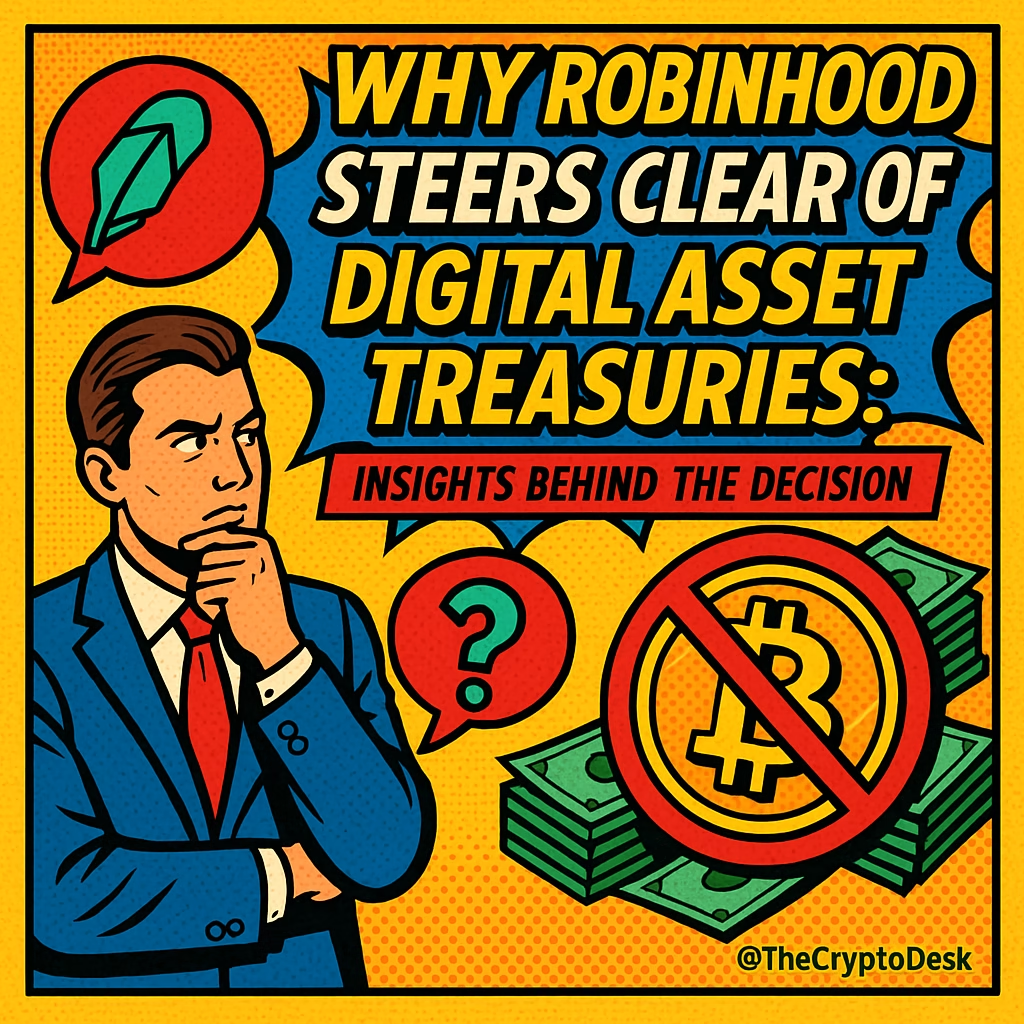In the ever-evolving landscape of cryptocurrency, Robinhood is adopting a cautious yet strategic approach when it comes to adding digital assets to its balance sheet. During the latest third-quarter earnings call, incoming CFO Shiv Verma conveyed the company’s philosophy: while Robinhood acknowledges the bustling treasury playbook that many firms are embracing, it remains in a “wait-and-see” mode regarding its own treasury investments. This thoughtful stance stands out in an industry where many are racing to secure cryptocurrency assets.
One of the critical elements behind Robinhood’s strategy is its commitment to maintaining alignment with its community of traders. Verma pointed out that Robinhood is already a significant player in the crypto trading arena, where it facilitates user transactions without needing to hold Bitcoin or other cryptocurrencies on its balance sheet. As the firm contemplates the implications of integrating digital assets into its holdings, they are weighing the potential benefits against the need for capital flexibility.
📌 **Why This Matters**: The choice not to immediately dive into crypto treasury holdings could reflect a deeper concern for shareholder interests amidst a volatile market. Companies like MicroStrategy have built massive Bitcoin reserves, yet the risks of capital being tied up in such assets can be substantial, particularly when market conditions fluctuate.
Robinhood’s broader crypto operations are certainly thriving, as evidenced by a staggering 129% increase in transaction-based revenue, reaching $730 million in Q3 alone. The platform reported a remarkable $268 million from crypto transactions, marking a phenomenal 300% surge compared to the previous year. This growth indicates a healthy appetite for digital assets among users, leading to better-than-expected earnings that surpassed Wall Street forecasts.
However, Verma highlighted the complexities involved in holding cryptocurrencies. While it might enhance user satisfaction to see Robinhood investing in crypto assets, such decisions could also restrict capital that could be utilized for other growth initiatives. Notably, shareholders already have the option to purchase Bitcoin directly through the platform, granting them exposure without necessitating the firm to take on additional risks inherent in price volatility.
🔥 **Expert Opinions**: This uneasy balance is not lost on industry experts. Notably, Columbia Business School’s Omid Malekan voiced concerns about the growing trend of digital asset treasuries, suggesting that some companies may be more focused on self-enrichment rather than fostering long-term value creation. He dubbed these treasury strategies as “extraction schemes,” especially as Bitcoin faces headwinds and the overall market value has seen a substantial decline.
👨🏫 Columbia professor @malekanoms calls digital asset treasuries “extraction schemes” as Bitcoin drops below $100K and crypto loses $1 trillion in value.#Bitcoin #DATs https://t.co/22ERtbcfe2— Cryptonews.com (@cryptonews) November 5, 2025
As the market grapples with falling prices and skepticism, companies like Robinhood are increasingly vigilant. With Bitcoin briefly dipping below the $100,000 mark and broader market valuations shedding over a trillion dollars since their peaks, the pressure on boards to justify crypto investments grows stronger. The current climate has sparked concerns, leading to a slowdown in corporate treasury activities. Coinbase’s David Duong noted a notable quiet period among treasury buyers post-market dip, signaling potential hesitancy among firms to engage with digital assets under current conditions.
🚀 **Future Outlook**: For Robinhood, the emphasis remains on capital efficiency, preferring to sidestep the risks of holding digital currencies directly while continuing to generate revenue through trading and custody services. Verma’s comments indicate a desire for flexibility, allowing the firm to pivot as market conditions evolve.
In summary, Robinhood’s measured approach may be a differentiating factor in a rapidly maturing industry. By prioritizing shareholder alignment and maintaining strategic flexibility, the company is positioning itself as a calculated participant in the cryptocurrency revolution. As the landscape continues to shift, it will be fascinating to watch how Robinhood navigates its options and when it decides to integrate digital assets into its treasury strategy.
As always, for those wanting to stay ahead in the crypto game, understanding these corporate strategies can provide valuable insights into the industry’s future direction. What do you think? Is Robinhood’s cautious stance a wise move in today’s uncertain markets?
